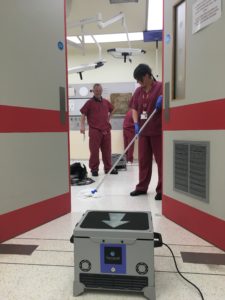United Lincolnshire Hospitals NHS Trust (ULHT) has purchased the hydrogen peroxide vapour (HPV) systems to help stop the spread of norovirus, MRSA and other drug-resistant micro-organisms. 
The machines use the vapour to totally disinfect an area and kill all known germs on contact. As the gas can be harmful to people, the cleaning can only be done in a room that is unoccupied and has been sealed off from all other areas.
ULHT Facilities Manager, Ian Hayden, said: “The machine works by releasing a vapour into the air that kills all known germs. It can get into all of the cracks and areas that may be harder to reach using traditional cleaning methods.
“We are really pleased to have these machines to make sure our hospitals are as clean as they can be. They are not used instead of the traditional methods, but as an extra resource we can use to clean a room, operating theatre or other area that may have been used by a patient with a highly infectious illness.”
The new machines are just one of the resources being used to prevent the spread of infections in the county’s hospitals.
ULHT Team Leader Jane Cain said: “These new machines and our deep clean teams provide extra support to all of our housekeepers who work so hard, day in and day out, on wards across our Trust.
“When a HPV machine is in action it enables all of our cleaning teams to focus on other areas of our hospitals until it has finished.
“It saves time and then gives us all peace of mind that all germs and bugs have gone and that the area is ready for patients and staff to use again.”
As the machines use a gas, it doesn’t cause damage to equipment and computers unlike steam cleaners and other more traditional methods. This means anything that may have been contaminated can be kept in the room during the cleaning process.
The Trust’s Head of Infection Prevention Control, Kevin Shaw, added: “These machines are a great asset, but nothing can replace the traditional simple steps of hand hygiene or visitors and staff staying away from hospital for 72 hours if you have had sickness or diarrhoea.
“We know bugs are becoming more resistant to antibiotics so we need to take any necessary steps to prevent patients getting infections whilst in our care settings. This new equipment will support the already well established cleaning systems and along with good hand hygiene by patients, their visitors and staff, we can help to reduce the risk of spreading harmful bugs to each other.”
